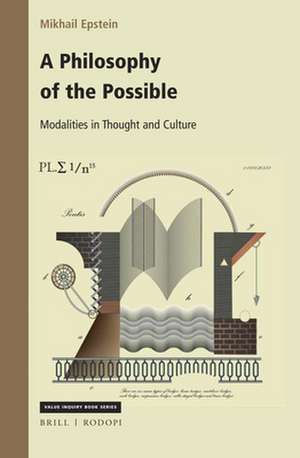A Philosophy of the Possible: Modalities in Thought and Culture: Value Inquiry Book Series / Contemporary Russian Philosophy, cartea 333
Autor Mikhail Epsteinen Limba Engleză Hardback – 19 iun 2019
Preț: 701.60 lei
Preț vechi: 855.60 lei
-18% Nou
Puncte Express: 1052
Preț estimativ în valută:
134.25€ • 140.46$ • 111.52£
134.25€ • 140.46$ • 111.52£
Carte indisponibilă temporar
Doresc să fiu notificat când acest titlu va fi disponibil:
Se trimite...
Preluare comenzi: 021 569.72.76
Specificații
ISBN-13: 9789004398337
ISBN-10: 9004398333
Dimensiuni: 155 x 235 mm
Greutate: 0.59 kg
Editura: Brill
Colecția Brill
Seria Value Inquiry Book Series / Contemporary Russian Philosophy
ISBN-10: 9004398333
Dimensiuni: 155 x 235 mm
Greutate: 0.59 kg
Editura: Brill
Colecția Brill
Seria Value Inquiry Book Series / Contemporary Russian Philosophy
Cuprins
Preface
&emspIntroduction: Fundamental Concepts of the Theory of the Possible
1 The Problem of Modalities in Contemporary Thought
2 A Preliminary Definition of the Modality of the Possible
3 The Ontological Status of Possible Worlds. Nominalism and Realism
4 The Principle of “Fullness” and the Problem of Realization of Possibilities
5 Duality and “Demonism” of the Possible
6 A Possibilistic Approach to the Possible
7 The Plan of the Book
1Criticism and Activism
2Philosophy and Reality
3Change of Modalities in the History of Philosophy
4Philosophy as Possibilistic Thinking
5The Area of the Thinkable: the Value of Thinking in Itself
6Theory, Utopia, and Hypothesis
7Catharsis of Thinking
8Personified Thinking
9Possible and Impossible: Aporia of Thinking
10Language, Thinking, and Signifiability
11Universals as Potentials: Conceptualism
12From the General to the Concrete and Universal
13Multiplication of Entities
14Philosophy as Parody and Grotesque
Introduction to Part 2
15Beyond Being and Nothingness: the Feeling of the Possible
16A World View, Not a Point of View: “A Net with No Knots”
17The Possible in Jean Derrida
18The Metaphysics of Deconstruction: the Main Terms
19The Radical Nature of Difference: Profit and Transcendence
20Center and Structure
21Reverse Metaphysics: the Other, the Play, and the Writing
22Différance and the Tao
23From Deconstruction to Construction
24Construction and Creativity
25De- and Con-
26Potentiation as Method: Eros of Thinking
27What is “The Interesting”? Proposed Criteria
28Small Metaphysics: the Unique
Introduction to Part 3
29Society
30Culture
31Ethics
32Psychology
33Religion
Conclusion
To be Able, to be, and to Know. A System of Modalities
1Definitions of Modality
A Typical Definitions
B The Specific Definition
2Оntic Modalities (Modalities of Being)
A “To Be” and “To Be Able” in the Ontological and Modal Perspectives
B Existence and Non-existence
C The Possible and the Contingent
D The Impossible and the Necessary
E Strong and Weak Modalities
F The General Scheme of Ontic Modalities
G Supermodalities: The Due and the Miraculous
3Еpistemic Modalities (Modalities of Knowledge)
4Pure (Potentialistic) Modalities
A Active Voice (Capacity, Need)
B Passive Voice (Permission, Coercion)
C Second-order Modalities
(1)Will and Power
(2)Desire and Love
5The Final Tables of Modalities
6Modal Categories in Various Disciplines
A Be Able – Possess – Have Value. Modality in Economics
B Necessity and Immortality: Modality in Eschatology
7Potentiology: Prospects for the New Discipline
Index of Names
Index of Subjects
&emspIntroduction: Fundamental Concepts of the Theory of the Possible
1 The Problem of Modalities in Contemporary Thought
2 A Preliminary Definition of the Modality of the Possible
3 The Ontological Status of Possible Worlds. Nominalism and Realism
4 The Principle of “Fullness” and the Problem of Realization of Possibilities
5 Duality and “Demonism” of the Possible
6 A Possibilistic Approach to the Possible
7 The Plan of the Book
Part 1: The Possible in Philosophy
1Criticism and Activism
2Philosophy and Reality
3Change of Modalities in the History of Philosophy
4Philosophy as Possibilistic Thinking
5The Area of the Thinkable: the Value of Thinking in Itself
6Theory, Utopia, and Hypothesis
7Catharsis of Thinking
8Personified Thinking
9Possible and Impossible: Aporia of Thinking
10Language, Thinking, and Signifiability
11Universals as Potentials: Conceptualism
12From the General to the Concrete and Universal
13Multiplication of Entities
14Philosophy as Parody and Grotesque
Part 2: The Fate of Metaphysics: from Deconstruction to Possibilization
Introduction to Part 2
Section 2.1: Reverse Metaphysics: Critique and Deconstruction
15Beyond Being and Nothingness: the Feeling of the Possible
16A World View, Not a Point of View: “A Net with No Knots”
17The Possible in Jean Derrida
18The Metaphysics of Deconstruction: the Main Terms
19The Radical Nature of Difference: Profit and Transcendence
20Center and Structure
21Reverse Metaphysics: the Other, the Play, and the Writing
22Différance and the Tao
Section 2.2: Construction and Possibilization
23From Deconstruction to Construction
24Construction and Creativity
25De- and Con-
26Potentiation as Method: Eros of Thinking
27What is “The Interesting”? Proposed Criteria
28Small Metaphysics: the Unique
Part 3: The Worlds of the Possible
Introduction to Part 3
29Society
30Culture
31Ethics
32Psychology
33Religion
Conclusion
Appendix
To be Able, to be, and to Know. A System of Modalities
1Definitions of Modality
A Typical Definitions
B The Specific Definition
2Оntic Modalities (Modalities of Being)
A “To Be” and “To Be Able” in the Ontological and Modal Perspectives
B Existence and Non-existence
C The Possible and the Contingent
D The Impossible and the Necessary
E Strong and Weak Modalities
F The General Scheme of Ontic Modalities
G Supermodalities: The Due and the Miraculous
3Еpistemic Modalities (Modalities of Knowledge)
4Pure (Potentialistic) Modalities
A Active Voice (Capacity, Need)
B Passive Voice (Permission, Coercion)
C Second-order Modalities
(1)Will and Power
(2)Desire and Love
5The Final Tables of Modalities
6Modal Categories in Various Disciplines
A Be Able – Possess – Have Value. Modality in Economics
B Necessity and Immortality: Modality in Eschatology
7Potentiology: Prospects for the New Discipline
Index of Names
Index of Subjects
Notă biografică
Mikhail Epstein, Ph.D. (1990), Academy of Sciences, USSR; S.C.Dobbs Professor of Cultural Theory and Russian literature at Emory University (USA). He has published 35 books and hundreds of articles in philosophy and cultural and literary studies translated into 23 languages.





